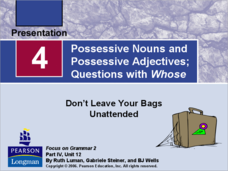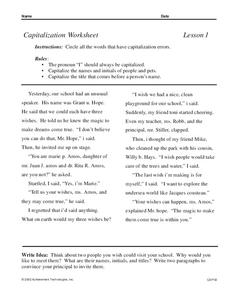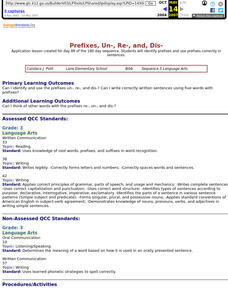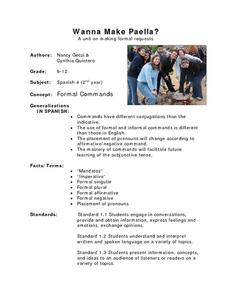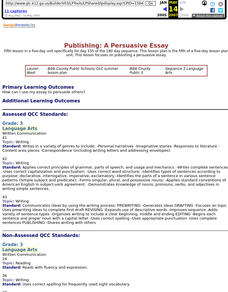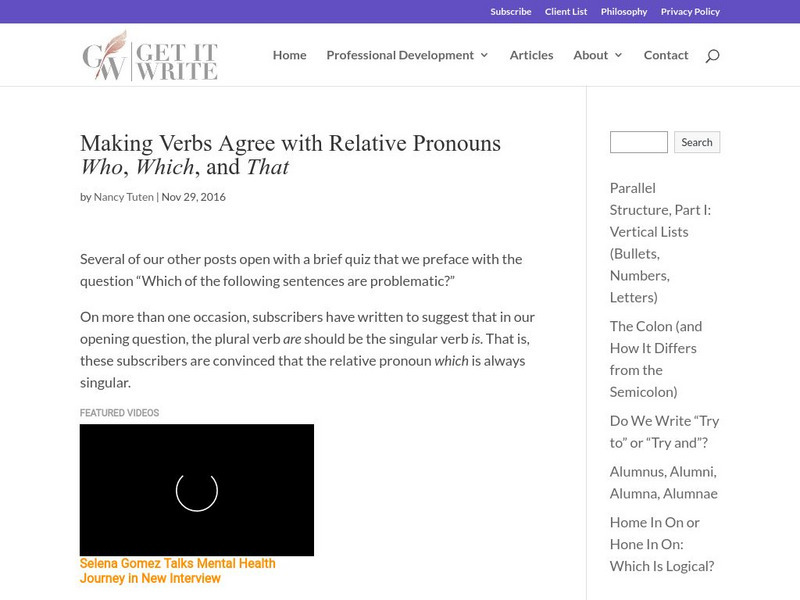Curated OER
Parts of Speech: Nouns
Second graders discuss nouns. In this language arts instructional activity, 2nd graders discuss nouns and pronouns. Students identify various types of nouns on a worksheet. Students play "Popcorn" Nouns.
Curated OER
Impersonal "It" and "There"
For this language arts worksheet, students first read an information page about the use of the impersonal "it" or "there" in the subject position of a sentence. Students then complete 18 questions in an online interactive worksheet.
Pearson
Possessive Nouns and Possessive Adjectives; Questions with Whose
Be as possessive as you like with a grammar slideshow on possessive nouns and adjectives. Whether it's your suitcase, my suitcase, or his suitcase, elementary learners decipher the ways that possessive nouns and...
Achievement Technologies
Language Arts Worksheets
Looking for some quick grammar warm-ups? What about handy spelling crossword puzzles? Find everything you need with a resource that contains practice worksheets for parts of speech, parts of a sentence, common grammatical errors, tricky...
Curated OER
Living to Eat, Eating to Live
Students develop a five paragraph essay.They write their essays, review rules related to subject/verb agreement and the use of transition words or devices. They find examples of transition words or devices in newspaper or magazine...
Curated OER
Grammar Puzzles
Students explore the parts of a sentence through analysis, design, and drawing in this nine lessons unit on Grammar. The diagramming of sentences comprises the main thrust of this unit through the utilization of higher cognitive skill...
Curated OER
Case and Perspective Test
For this case and perspective worksheet, students identify case and perspective of pronouns, writing matching letters on blanks. Students then identify words as plural or possessive.
Curated OER
Adjective Clauses
Have your class practice using adjective clauses with this resource. Learners discuss adjective clauses and the words commonly found in these types of sentences. This resource is a comprehensive and worthwhile exploration.
Curriculum Corner
“I Can” Common Core! 3rd Grade Language
Support third graders with developing their language skills using this Common Core checklist. With each standard written as an I can statement, children are given clear learning goals to work toward throughout the year.
Curated OER
Verb Sheet
High schoolers complete template on the conjugation of any tense of verbs in Spanish, and then write teacher-dictated sentences using these verbs.
Curated OER
Nouns and Verbs and Proper Nouns, Oh My!
Second graders identify nouns and verbs in written communication. They distinguish between between nouns, proper nouns, and verbs. Students discuss the difference between these parts of speech. In partners, 2nd graders write a sentences...
Alabama Learning Exchange
Nouns, Verbs, and Describing Words
Second graders photograph items in their school and write a sentence that describes the items. They use different colored fonts when word processing the sentence to highlight nouns, verbs, and adjectives.
Curated OER
Happy Birthday Dr. Seuss!
Students read "Green Eggs and Ham" in celebration of Dr. Seuss's birthday and visit a storymaker website. Students create and type a three scene story using characters from Dr. Seuss's books and share their story with the class.
Curated OER
Wacky Web Tales
Students study the parts of speech and then review them. They identify each part of speech and place them on a tree map. Then they visit a website to create a "Wacky Web Tale" using information from the tree map. They print their tales...
Curated OER
Prefixes, Un-, Re-, and, Dis-
Third graders identify prefixes and use prefixes correctly in sentences. They edit and change sentences containing prefixes.
Curated OER
Whose Voice Do I Hear?
Fifth graders examine the power of voice in writing by completing a story using words following a particular voice. They take simple nursery rhymes, then attempt to put their own voice to a revised version. An interesting instructional...
Curated OER
Making Formal Requests
Students investigate the concept of making formal requests and examples are included in the lesson for teacher presentation. They practice using the phrases in a variety of situations and then make presentations for others to hear.
Curated OER
Publishing: A Persuasive Essay
Third graders are given an opportunity to create a visual to accompany their presentations of their persuasive essays. They may use the computer or other media as resources.
Towson University
Towson University: Online Writing Support: Pronouns
This entry focuses on the kinds of pronouns including personal, relative, indefinite, demonstrative, interrogative, reflexive/intensive, and singular and plural pronouns. It provides an explanation and examples of each.
University of Wisconsin
University of Wisconsin, Madison: Subject Verb Agreement
This excellent site explains numerous guidelines, complete with examples, for determining subject-verb agreement.
Towson University
Towson University: Subject Verb Agreement
This webpage provides a list of nine rules for subject-verb agreement including examples with detailed explanations including arrows and notes as well as exceptions to the rules. It also provides links to terms which are defined with...
Sophia Learning
Sophia: Plurals Often Treated as Singular
This video lesson focuses on words that appear plural but take a singular verb. It discusses the rules of subject-verb agreement, and then looks at three kinds of confusing words: indefinite pronouns, collective nouns, and misleading...
Capital Community College Foundation
Guide to Grammar and Writing: Cases of Nouns and Pronouns
In this writing and grammar tutorial, learn how to distinguish and use nouns and pronouns in English and whether they are subjective, nominative, possessive, or objective.
Get It Write
Get It Write: Making Verbs Agree With Relative Pronouns
A tutorial explaining that relative pronouns "that", "which", and "who" can be singular or plural, so be sure to check to be sure you are using the correct verb, singular or plural, in your sentence. A brief quiz checks your understanding.




